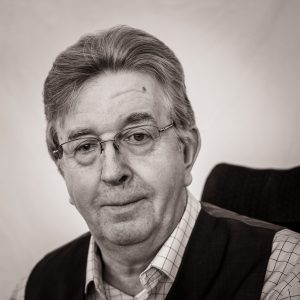Blog
And now, Coronavirus - a message from our Chair, Dr Rupert Earl
That we are in the midst of a grave national emergency is self-evident – families separated, factories and workplaces closed, severe restrictions on movement that were unthinkable just a few weeks ago. Though we will indeed overcome this together, the brutal truth is that we are not all in this together. Hard and uncomfortable that this truth may be, the reality is that the burden of this crisis falls, unfairly, on vulnerable people and their families, and those who care for them.
SCI people have always had to fight. Grit and determination are needed in the pursuit of a better tomorrow. After the trauma of injury or diagnosis – life changing for the injured person and their loved ones – there is the queue for a bed in a specialist centre. Then the postcode lottery of securing essential and life-sustaining care or being forced into a nursing home if the family home isn’t suitable or your local NHS decided not to fund you.
And it really is a fight. Genuinely, right now, it’s a matter of life and death. “Vulnerable” and “high risk” mean exactly that. They’re not just cheap phrases thrown around for effect – SCI people, especially those with high level tetraplegia or compromised immune systems are much more vulnerable to developing severe and life-threatening complications. The system is well intentioned and committed but clearly struggling. PPE for at home care workers – I only received mine today and I know many others who are still waiting. Specialist SCI Centres – already with too few beds to meet the needs of injured people – are under pressure and sending people home early before their rehabilitation is complete or without being able to carry out surgical repair of their pressure ulcers. Ethical dilemmas are becoming real – we’ve heard from SCI people who are concerned that over-pressed clinicians may allocate short-in-supply ventilators to other patients if they fall seriously ill. There are reliable accounts of medical staff encouraging vulnerable people to sign ‘do not resuscitate’ advance care orders. None of this is scare mongering.
So, what to do? Much is familiar – stay inside, be rigorous with hygiene measures and observe social distancing. And the extra demands on SCI people? Be prepared – have an agreed care plan in place in case you’re admitted to a general hospital (SIA can help with this just visit our website), ensure you have a good supply of PPE and work with your care provider to have ‘Plan B’ if your carers fall ill. Be as active as you can – physically and mentally. Stay informed but give news and social media a break at times as it can be a bit overwhelming. And keep in touch – with friends and family and with SIA.
That spirit of self-help, of the SCI community coming together in solidarity and collaboration, will get us through. Since 1974, SIA has always been there for injured people. I am proud to lead an organisation determined that no SCI person is left to face Coronavirus alone. Now the need is greater than ever and we’re responding in new and different ways. We are offering information, advocacy and support to every one of the 50,000 people living with SCI in this country with much of that delivered by other SCI people. We can’t meet people face to face, so we’ve virtually expanded our support network. We’ve redeployed our teams to provide telephone, email and online support to anyone with concerns about Coronavirus and SCI. We’ve increased the hours of our Support Line (0800 980 0501) so you can now call us Monday to Friday from 9am – 5pm. You’ll find new web pages (www.spinal.co.uk/coronavirus) packed with expert advice on SCI and Coronavirus – how to protect your health and what to do if admitted are just two topics – and we’re running regular online cafes on different topics. We can even arrange delivery of your regular pharmaceutical and appliance needs directly to your door via our SIA Healthcare service.
It’s been wonderful to see such support for NHS staff and carers, yet ironic that we now all rely so much on people who just weeks ago were considered ‘unskilled’ in some quarters as part of the immigration debate due to their salary. Perhaps one good thing that could come out of all this is that our politicians and leaders re-think how to judge ‘value’ and ‘worth’; after all, even our Prime Minister has now seen the NHS in action from the inside, highlighting the lifesaving care he received from nurses from New Zealand and Portugal. We can but hope.
Dr Rupert Earl
SIA Chair
